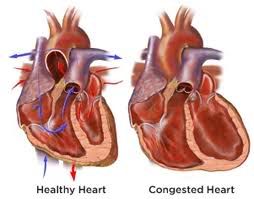Congestive heart failure(CHF) is a common condition that develops after the heart becomes damaged or weakened by diseases of the heart including heart attacks and other medical conditions.In CHF the heart is unable to adequately pump blood throughout the body and/or unable to prevent blood from "backing up" into the lungs.
Risk factors for heart disease:
- smoking
- being overweight
- sedentary lifestyle
Underlying conditions that increase the risk for heart failure include the following:
- Abnormal heart rhythm (arrhythmia)
- Abnormal heart valve(s)
- Alcoholism and drug abuse
- Coronary heart disease (CHD; also called atherosclerosis)
- Damaged heart muscle
Diagnostic tests:
- blood tests
- electrocardiogram (ECG)
- chest X-ray
- echocardiogram
- stress test
- coronary angiogram
Signs and symptoms:
- dyspnea
- orthopnia
- paroxysmal nocturnal dyspnea
- productive cough
- frothy salivation
- cyanosis
- rales/crackles
- brochial wheezing
- pulsus alternans
- anorexia and body malaise
- leg or vein swelling
- PMI (point of maximum impulse/apical pulse rate) is displaced literally
- S3 (ventricular gallop)
Treatment/Medication:
- morphine sulfate
- aminophelline
- digoxin
- diuretics
- oxygen
- gases, blood monitor







0 comments:
Post a Comment